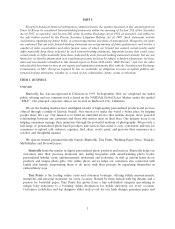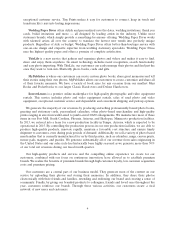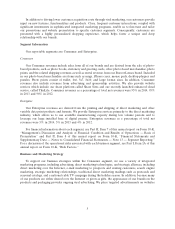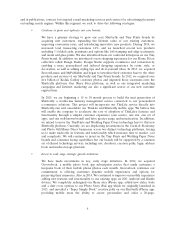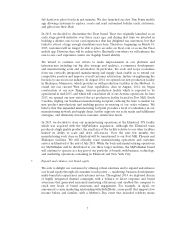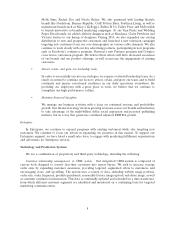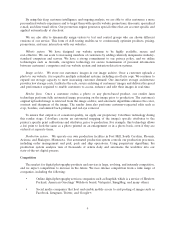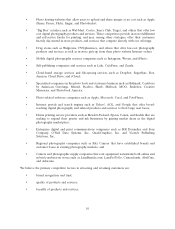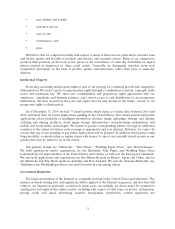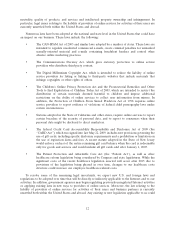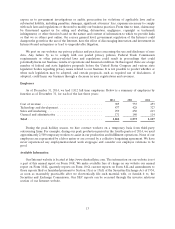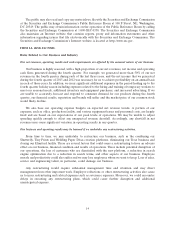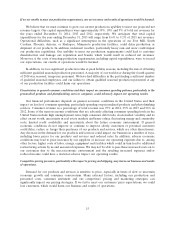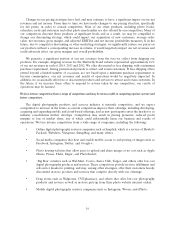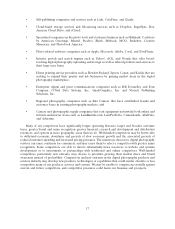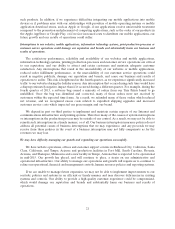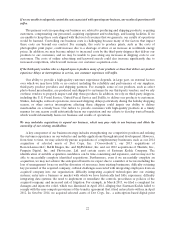Shutterfly 2014 Annual Report Download - page 13
Download and view the complete annual report
Please find page 13 of the 2014 Shutterfly annual report below. You can navigate through the pages in the report by either clicking on the pages listed below, or by using the keyword search tool below to find specific information within the annual report.neutrality, quality of products, and services and intellectual property ownership and infringement. In
particular, legal issues relating to the liability of providers of online services for activities of their users are
currently unsettled both within the United States and abroad.
Numerous laws have been adopted at the national and state level in the United States that could have
an impact on our business. These laws include the following:
• The CAN-SPAM Act of 2003 and similar laws adopted by a number of states. These laws are
intended to regulate unsolicited commercial e-mails, create criminal penalties for unmarked
sexually-oriented material and e-mails containing fraudulent headers and control other
abusive online marketing practices.
• The Communications Decency Act, which gives statutory protection to online service
providers who distribute third-party content.
• The Digital Millennium Copyright Act, which is intended to reduce the liability of online
service providers for listing or linking to third-party websites that include materials that
infringe copyrights or other rights of others.
• The Children’s Online Privacy Protection Act and the Prosecutorial Remedies and Other
Tools to End Exploitation of Children Today Act of 2003, which are intended to restrict the
distribution of certain materials deemed harmful to children and impose additional
restrictions on the ability of online services to collect user information from minors. In
addition, the Protection of Children From Sexual Predators Act of 1998 requires online
service providers to report evidence of violations of federal child pornography laws under
certain circumstances.
• Statutes adopted in the State of California and other states, require online services to report
certain breaches of the security of personal data, and to report to consumers when their
personal data might be disclosed to direct marketers.
• The federal Credit Card Accountability Responsibility and Disclosure Act of 2009 (the
‘‘CARD Act’’), which was signed into law May 22, 2009, includes new provisions governing the
use of gift cards, including specific disclosure requirements and a prohibition or limitation on
the use of expiration dates and fees. A recent statute adopted in the State of New Jersey
would enforce escheat of the entire remaining gift card balance when the card is redeemable
only for goods and services and would include all gift cards sold after January 1, 2003.
• The Patient Protection and Affordable Care Act (the ‘‘Patient Act’’), as well as other
healthcare reform legislation being considered by Congress and state legislatures. While the
significant costs of the recent healthcare legislation enacted will occur after 2013 due to
provisions of the legislation being phased in over time, changes to our healthcare costs
structure could increase our employee healthcare-related costs.
To resolve some of the remaining legal uncertainty, we expect new U.S. and foreign laws and
regulations to be adopted over time that will be directly or indirectly applicable to the Internet and to our
activities. In addition, government agencies may begin regulating previously unregulated Internet activities
or applying existing laws in new ways to providers of online services. Moreover, the law relating to the
liability of providers of online services for activities of their users and business partners is currently
unsettled both within the United States and abroad. Any existing or new legislation applicable to us could
12



